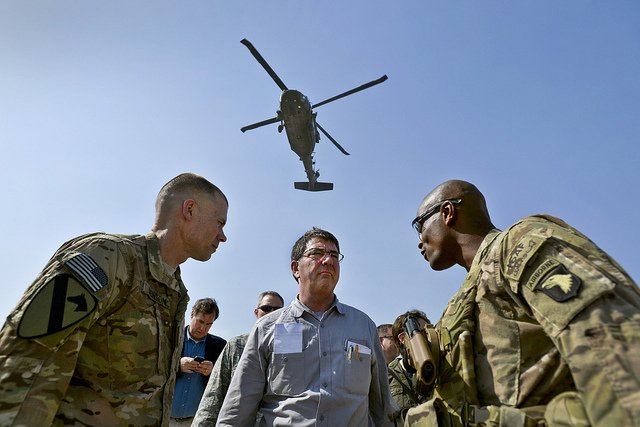Ashton Carter and the evolution of the rebalance
Posted By Andrew Kwon on April 23, 2015 @ 10:10
In their recent piece [2] on The Strategist, Natalie Sambhi and David Lang suggested that the US rebalance to the Asia–Pacific will be ‘saved’ by Hillary Clinton should she win the US presidency. While I don’t disagree, the authors do assume that no one else can start saving it in the meantime. Enter new US Secretary of Defense Ashton Carter. While Secretary Carter may seem a mere placeholder as the clock runs down on the Obama administration, it would be unwise to underestimate his potential.
It’s a common misperception that the rebalance hasn’t moved forward since 2013. A focus on the Middle East and related expertise within the administration, most famously by John Kerry and later Chuck Hagel, raised questions among some (including this author [3]) as to whether the Obama administration was following through on its ambitious agenda. But a lack of upper-tier leadership doesn’t necessarily indicate a lack of movement.
Since 2013, mid- to senior-level US government bureaucrats and advisors, like John Anderson, Scot Marciel, Daniel Russel, Wendy Cutler and Evan Medeiros, have continued the fight, and their efforts constitute a comprehensive body of work. Though largely unknown outside of government and expert circles, they’ve kept the rebalance alive. But it’s perhaps because these individuals have been keeping the rebalance going that the lack of senior leadership seems more significant.
A common concern expressed by officials from major US ally states in the Indo–Pacific has been the absence of authoritative leadership on Asia within the Obama administration. Though many caveat this with an appreciation for the President’s interest in the region, they’re fully aware that his attention is ever divided. Despite efforts at all levels of the US government to sustain the rebalance, there’s a clear limit to achievability in the absence of a proverbial helmsman. A senior leader not only serves as the public face of the effort but also ties together the disparate streams, providing consistency, focus and coherence.
The leader of the rebalance effort—and US asia policy more generally—must be the Secretary of State or the Secretary of Defense. In the first case, the US’ chief diplomat would naturally be expected to lead any major shift in US foreign policy. In the second, as the Department of Defense has the largest US government stake in Asia, its leader is critical to shaping both the form and substance of engagement in the region. But how have the holders of those offices performed since 2013?
While Secretaries John Kerry, Leon Panetta and Chuck Hagel are all accomplished, each man was chosen to face specific tactical situations; the rebalance wasn’t a priority for any of them. Kerry’s emerged as the point man for renewed diplomatic efforts [4] in the Middle East. During his brief tenure as Secretary of Defense, Panetta’s priority was to ensure the Pentagon followed through [5] on budget adjustments started by his predecessor, Robert Gates. Finally, Hagel was selected, in part, based on a hope [6] that his appointment would help smooth relations with Congress.
That’s not to say they lacked enthusiasm for US Asia policy. In fact, prior to his resignation, Secretary Hagel was noted for the energy [7] he displayed during his travels to the Indo–Pacific, particularly his efforts to reassure allies and engage key stakeholders. But enthusiasm isn’t an alternative to being knowledgeable, nor is it possible to feign interest with any credibility. This wasn’t lost on US’ allies in the region; it was a mistake to assume that it would have been.
Among the more interesting things to come out of Secretary Carter’s speech [8] in Arizona on 6 April was the exchange [9] between prominent think tankers across the Pacific. While the inconsistencies raised shouldn’t be ignored, it would be a disservice to disregard the underlying reason for the quick defence: Ashton Carter, as a representative of the US, is taking Asia seriously.
The mixed impression from the US’ most senior defence official speaking on trade is undeniable. However, equally undeniable are the credentials of the man making the case. Secretary Carter’s long advocacy for strong US Asia policy has been well reported, ranging from expanded defence cooperation with India to arguing the merits of a more comprehensive US presence during the 1990s. However these are only indicative of his deep interest and constitute only a part of his potential consequentialism.
The other factor which defines Ashton Carter’s potential, and something which I suspect the Obama Administration and the US expert community hope allies will notice, is what Carter is versus what his immediate predecessors weren’t: an official chosen for his expertise in dealing with political, strategic, technical, and bureaucratic complexities. More importantly, Carter is not only respected throughout the region, but also at home and across party lines.
Natalie and David recognise that, if successful, Hillary Clinton would ‘face an international environment that’s familiar in thematic terms only with a set of strategic challenges more acute than they are today and were when she left the Obama administration just over two years ago.’ While they’re hopeful and confident that Hillary Clinton could rise to meet those challenges, some problems simply won’t wait. In that regard, Ash Carter ticks all the right boxes and he has made it clear that he’s ready and willing to start saving the rebalance now.
Article printed from The Strategist: https://www.aspistrategist.org.au
URL to article: https://www.aspistrategist.org.au/ashton-carter-and-the-evolution-of-the-rebalance/
URLs in this post:
[1] Image: http://www.aspistrategist.org.au/wp-content/uploads/2015/04/8743471653_4b37d7acdd_z.jpg
[2] recent piece: http://www.aspistrategist.org.au/hillary-rodham-clinton-for-asia/
[3] author: http://www.aspistrategist.org.au/the-pivot-and-the-red-line-the-syrian-civil-war-and-us-credibility-in-the-asia-pacific/
[4] diplomatic efforts: http://www.cfr.org/weapons-of-mass-destruction/why-iran-framework-extraordinary/p36407
[5] followed through: http://www.wired.com/2011/06/panettas-excellent-pentagon-adventure-cut-cash-rewrite-strategy/
[6] hope: http://www.theatlantic.com/politics/archive/2013/01/6-reasons-obama-is-nominating-chuck-hagel-for-secretary-of-defense/266879/
[7] energy: http://www.defense.gov/home/features/2014/0414_hagel1/
[8] speech: http://www.defense.gov/Speeches/Speech.aspx?SpeechID=1929
[9] exchange: http://www.lowyinterpreter.org/post/2015/04/09/More-on-Ashton-Carters-rebalance-speech.aspx
Click here to print.
